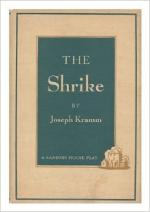|
This section contains 1,549 words (approx. 4 pages at 400 words per page) |

|
Ozersky is a critic, essayist, and cultural historian. In this essay, Ozersky describes some of the ways in which Kramm's play expresses the politics and fears of the early 1950s, when it was written.
Joseph Kramm's The Shrike is a powerful play, even nearly fifty years after it was written. It tells a familiar story: an unhappy man is institutionalized when he attempts suicide, and finds himself a prisoner of his doctors' notion of who is "sane." While this remains a compelling scenario even today, readers will understand The Shrike better if they look at the play in the context of the times it was written. Like Arthur Miller's The Crucible, The Shrike meant something very different to its cold war audience than it might to a reader encountering it for the first time today.
Contemporary readers of The Shrike, however, are more likely to be reminded...
|
This section contains 1,549 words (approx. 4 pages at 400 words per page) |

|




